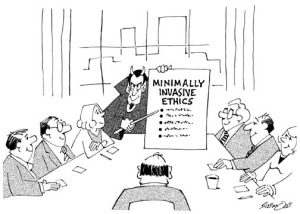 Our White Paper on Ethics discusses a number of ethical approaches used to determine what is ethical in the modern world. What is not covered in the White Paper is the evolution of ethical thinking. A blog post by Ricardo I. Guido Lavalle outlining a presentation by Prof. Clovis de Barros, who teaches Ethics at Universidade de Sao Paulo (USP), Brazil; fills this gap.
Our White Paper on Ethics discusses a number of ethical approaches used to determine what is ethical in the modern world. What is not covered in the White Paper is the evolution of ethical thinking. A blog post by Ricardo I. Guido Lavalle outlining a presentation by Prof. Clovis de Barros, who teaches Ethics at Universidade de Sao Paulo (USP), Brazil; fills this gap.
Prof. Clovis suggests Ethics evolved through five main phases outlined below:
- Greek times, when ethics were about fitting oneself into the great cosmological order. Right actions were those that helped the Cosmos achieve its maximum order. From this standpoint Greek philosophers (mainly Aristotle) assumed rigid, stable social layers where aristocracy had the most part in the game.
- Consequentialism, holds that the consequences of one’s conduct are the ultimate basis for any judgment about the rightness or wrongness of that conduct. Niccolo Macchiavelli (The Prince, 1513) is the best known proponent of this school of thought; he strove to maximize prince’s power. Right actions were those that had achieved the most power for the prince. Attention here, the right actions were considered right after they proved to be efficient in achieving the desired outcome – ‘the ends justify the means’.
- Utilitarianism, holds that the proper course of action is the one that maximises utility, usually defined as maximizing total benefit whilst reducing suffering or the negative consequences. Proposed by Bentham (1780) and John Stuart Mills, is a great justification for liberalism and aims for ‘the greatest happiness of the greatest number’. It is a simple and attractive standpoint, and it even fits with common democratic views. However, it presents some issues regarding minorities.
- With Immanuel Kant (1781) emerges the inner spiritual origin of ethics. Kant contested utilitarianism with his deontology. An action was right if the very inspiration of it was good, regardless of the consequences. The ultimate goal was to form a corpus of universally valid actions, such they were valid in any context, and forever. The puritan ethics of duty and good purpose is an earlier expression of this long-lasting and very successful ethical view.
- In contrast to all previous views, post-modernist ethics is about relativism. Ethics has become transactional, an agreement between parties, where openness and transparency of purposes are crucial. Post-modern Ethics is the result of a social contract, and agreement. Professional organisations such as PMI develop an agreed code of ethics to guide their members.
However, the transactional basis of post-modern ethics does not eliminate many of the founding concepts developed over millennia. PMI’s Code of Ethics and Professional Conduct balances many of these themes:
- Overall the spirit of the Code is Kantian; a code developed by a ‘global’ body should seek to be of universal applicability.
- Some elements of the Code are a quest for the good intentions inherent in Greek virtues (honour and fairness), (2.4 We make commitments and promises, implied or explicit, in good faith)
- Others tend to utilitarian (2.1 We make decisions and take actions based on the best interests of society, public safety, and the environment).
- Whilst others are post-modern ethics (3.1 We proactively and fully disclose any real or potential conflicts of interest to the appropriate stakeholders.).
What this brief scan of history highlights is the way the long history of ethical thinking affects the modern definitions of ethics. The White Paper looks at their practical application.

Good article and new terms to learn on ethics.
I found some free ethics Q in google play store android app’ PMP Ethics exam lite’ which is good to try.